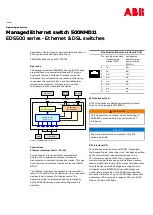
Configuring IP Information
Domain Name Systems
Cisco Small Business 200 1.1 Series Smart Switch Administration Guide
226
16
Defining DNS Servers
Use the
DNS Servers
page to enable the DNS feature, configure the DNS servers
and set the default domain used by the switch.
STEP 1
Click
IP Configuration
>
Domain Name System
>
DNS Servers
. The
DNS
Servers
page opens.
STEP 2
Enter the parameters.
•
DNS
—Select to designate the switch as a DNS client which resolves DNS
names into IP addresses through one or more configured DNS servers.
•
Default Domain Name
—Enter the default DNS domain name (1–158
characters). The switch appends this to all non-fully qualified domain names
(FQDNs) turning them into FQDNs.
•
Type
—Displays the default domain type options:
-
DHCP
—The default domain name is dynamically assigned by the DHCP
server.
-
Static
—The default domain name is user-defined.
-
N/A—No default domain name.
DNS Server Table:
•
DNS Server
—The IP addresses of the DNS servers. Up to eight DNS servers
can be defined.
•
Server State
—The active DNS server. There can be only one active server.
Each static server has a priority, a lower value means a higher priority. When
first time the request is sent, static server with lowest priority is chosen. If
after two retries there is no response from this server, the next server with
the next lowest priority is selected. If none of the static servers respond, the
first dynamic server on the table, sorted by IP address (low to high), is
selected.
STEP 3
Click
Apply
. The Running Configuration file is updated.
STEP 4
To add a DNS server, click
Add.
The
Add DNS Server
page opens.
STEP 5
Enter the parameters.
•
IP Version
—Select Version 6 for IPv6 or Version 4 for IPv4.
















































